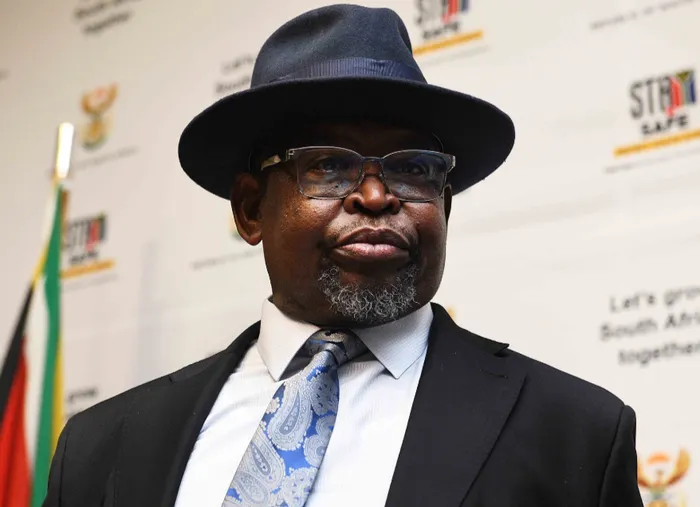
Enoch Godongwana, the Minister of Finance, announced that VAT would be scrapped. Advocate Lavan Gopaul asks where the shortfall will now come from
Image: Independent Newspapers
THE Finance Minister in South Africa has decided not to impose the 0.5% increase in VAT proposed for May 1, 2025. This comes after weeks of political tussle and debate between members of the Government of National Unity (GNU) as well as various parties.
Indeed, this point may be the reason for a potential abrogation of the GNU.
The increase of 0.5% on May 1 and a further 0.5% in a year was expected to add a cumulative R30 billion to our national revenue, while the SRD grant of R370 per month introduced during Covid-19 and continued over the years to come to the rescue of the poor has been cancelled to assist the minister with a further R35 billion.
These austerity measures are critically needed to stabilise public finances amid rising debt and sluggish economic growth. The decision by the minister to halt the increase in VAT raises key questions, including why the minister reversed the decision, and how the R30 billion shortfall will be addressed.
What are the macroeconomic implications for inflation, interest rates, economic growth and employment? What are the reasons for the government's abandonment of the VAT increase?
With a considerable amount of political pressure and public backlash, potential cracks within the GNU, which backs the tax hike, are politically risky. VAT is a regressive tax, disproportionately affecting low-income households despite zero-rated essentials. Dozens of civil society groups and unions strongly opposed the hike, arguing it would deepen inequality.
The coalition dynamics, particularly between the ANC, DA, and IFP within the GNU partnership, require policy compromises. Both the IFP and the DA opposed the VAT increase from the time of the original budget speech. However, the Deputy Minister of Finance is a DA member, implying they would have known about the proposed increase before it was tabled in parliament.
However, the choice to sidestep the 0.5% VAT hike could be a strategic concession to maintain coalition stability within the GNU. The Macroeconomic Considerations include, notably, inflation concerns.
A VAT hike would increase consumer prices, exacerbating inflation. We have experienced several bouts of inflation due to rand weakness and agricultural price increases as a consequence of the Russia /Ukraine war. The South African Reserve Bank (SARB) would likely respond by increasing interest rates if we observe an increase in inflation. A country with abnormally high unemployment would experience a stifling economy in the face of inflation and higher interest rates.
If VAT were to increase, economic growth would be stunted, and this could reduce disposable income, weakening consumer demand in an already sluggish economy (GDP growth is below 1% currently). Several economic sectors, including the fragile SMES, would have faced margin pressures.
Now that we have shelved VAT, we need to consider the fiscal impact and the R60 billion question of where the shortfall will come from. The government must find alternative revenue sources or spending cuts to compensate for the R60 billion gap.
Alternative tax measures include higher sin taxes and fuel levies, with increased excise duties on alcohol, tobacco, and sugary beverages (historically raised annually). We could also consider a fuel levy hike to the national levy, while being sensitive amid high petrol prices. It currently contributes R93 billion, and the minister may look to increase this levy.
The government could consider altering the Wealth & Capital Gains Taxes by introducing a higher marginal tax rate for top earners (above R1.5 million/year), and they could also consider adjusting capital gains tax inclusion rates (currently 40% for individuals).
The revenue authorities could look at closing some of the tax loopholes and stepping up their enforcement. SARS could intensify audits on high-net-worth individuals and corporations.
Targeting transfer pricing abuses by multinational companies may result in a massive revenue find for SARS. On the flip side of the equation is the need for expenditure cuts. The minister may consider reducing the Public Wage Bill. The state wage bill of more than R700 billion in 2024/25 has received much criticism for its inefficiencies, given that the country is underserved in many areas, it speaks to an already small headcount and has more to do with reorganisation.
SOE bailouts have been blamed for consuming too much revenue and have a cloud of abuse of funds surrounding them. Successive finance ministers have admitted that SOES have been a budget conundrum; the possibility of cutting funds to Eskom, Transnet, and SAA could save billions, but risks service collapse.
The reallocation of funds, particularly redirecting underspent budgets, including infrastructure projects delayed by corruption, which much of the infrastructural spend is essential in levelling the imbalances caused by apartheid. It is unlikely that there will be substantial changes to the infrastructural budget. Many have contended that the real reason for some right learning parties wanting to block the VAT increase was to diminish the spending on social services, the various grants, including the old age and child grants, which assist the poorest of the poor in the country. We currently exist under the yoke of ultra-low employment and minuscule GDP growth; these conditions demand social services to come to the rescue.
The immediate macroeconomic implications of no increase to VAT may create a mood for lower inflation pressure, given that VAT directly impacts the Consumer Price Index(CPI); however, a shortfall in revenue could mean that the government may have to get into more debt. While SARB may hold interest rates steady, the repo rate currently sits at 7.5% if inflation remains constant.
However, the uncertainty of revenue shortfall and the need for more government debt could have a further inflationary impact, leading to SARB changing interest rates in the future. Householders will breathe a sigh of relief on consumer spending and growth, as no VAT increase preserves disposable income, aiding the retail and services sectors. Business confidence will likely stabilise, and a constant in tax policy could encourage investment.
The financial markets, particularly bond markets where government debt is traded, will record the uncertainty of revenue shortfall, which may lead to a thinking that increased government debt concerns could raise borrowing costs.
The Rand is likely to be volatile due to fiscal uncertainty, and there is a risk that the currency may weaken if deficit fears grow. We have potential for a political fallout within the GNU in its current form that may have many possibilities with profound potential policy changes for the country.
The DA and business groups will applaud the move, seeing it as pro-growth. While other parties and groups such as COSATU, MK and EFF (while not part of the GNU) may still demand wealth taxes further testing GNU cohesion.
The public perception will likely observe a boost in short-term popularity, where low/middle-income households will welcome the decision. There may be long-term skepticism if service delivery deteriorates due to budget cuts or a large increase in government debt, and frustration may resurface. The gamble to keep VAT unchanged is a popularity and political win, but a fiscal challenge.
The government must now: Secure alternative revenue (possibly from sin taxes, wealth taxes, fuel levy and enforcement). Control spending (possibly from the wage bill, SOES) to avoid a debt spiral. Balance growth & inflation to prevent SARB rate hikes. If managed well, this could stabilise the GNU and support recovery. If mishandled, it risks fiscal slippage and investor distrust.

Lavan Gopaul
Image: Supplied
Advocate Lavan Gopaul is the director of Merchant Afrika.
** The views expressed do not necessarily reflect the views of IOL or Independent Media.
Related Topics: